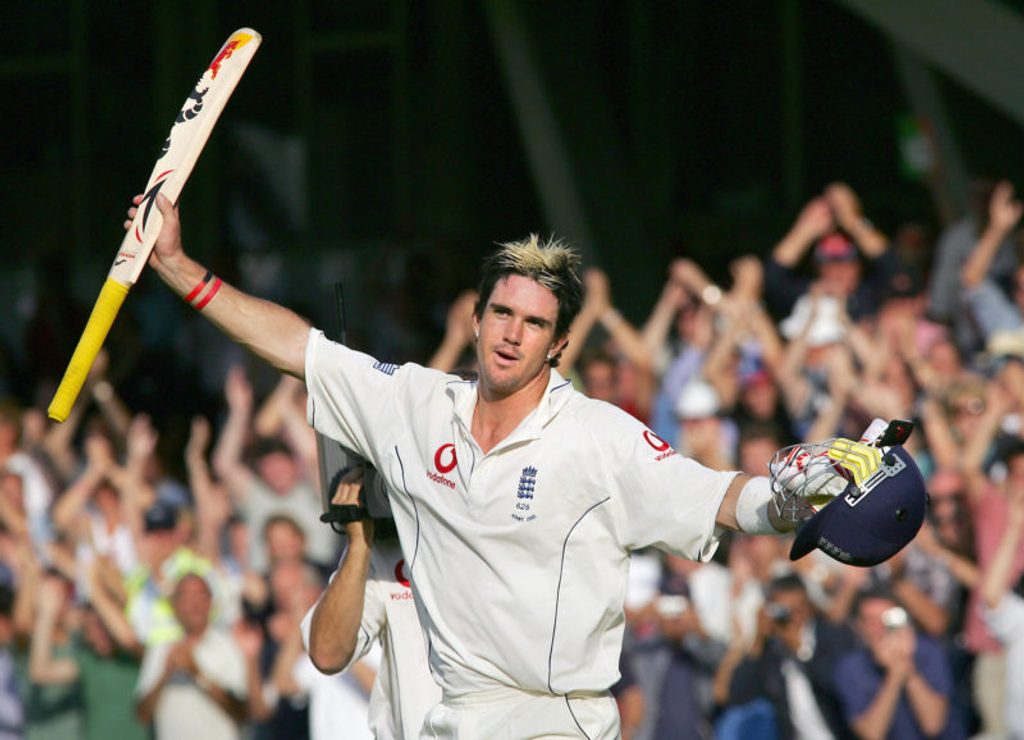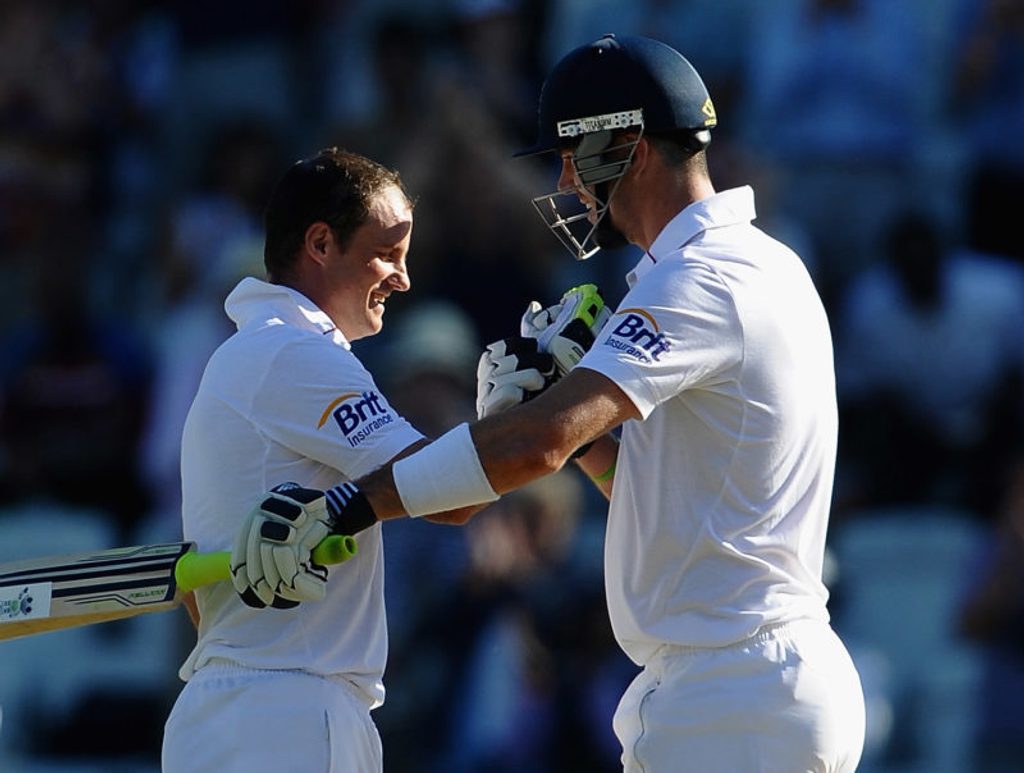
Tom Holland contends that Kevin Pietersen is a hero for our age – Beowulf, Achilles and Lancelot rolled into one.
This piece originally featured in issue 1 of The Nightwatchman, Wisden’s cricket quarterly
Buy the 2018 Collection (issues 21-24) now and save £5 when you use coupon code WCM5
Originally published in 2013; illustration by Joe Provis
When George Lucas sat down in the mid-1970s to write a film script set in a galaxy far, far away, he had high ambitions. His aim was to make a film of literally mythic power. His manual was a book called The Hero with a Thousand Faces, in which the author, Joseph Campbell, argued that mythologies everywhere all draw on the same basic themes. This is why the story of a great hero has such universal appeal. His feats, his flaws, the arc of his quest: all reach deep into the subconscious. Lucas learned the lesson well. The result, of course, was Star Wars.
Sport, unlike a movie, has no script. People would never watch it otherwise. Even so, there is the odd sportsman whose career strikes such chords in the imagination that it is hard not to feel that someone, somewhere, must have made him up. English cricket has certainly not been lacking for heroes these past 10 years. A decade ago, few fans would have imagined in their wildest dreams that England might end up three-times Ashes victors, and briefly top the Test rankings.
Andrew Flintoff and Michael Vaughan, Andrew Strauss and Graeme Swann: these are names fit to rank with any in English cricket history. The present captain – a clean-cut former chorister who just cannot help himself scoring centuries – could hardly look more like a hero if he tried. Yet Joseph Campbell, in the admittedly improbable event that he could be resurrected and endowed with a working knowledge of cricket, would present none of these stars with the palm. There is only the one possible candidate. Kevin Pietersen may not have a lightsabre, but he is undoubtedly English cricket’s very own Hero with a Thousand Faces.
 An early step on the path to greatness
An early step on the path to greatness
The path to greatness is familiar from countless myths. The hero is born in obscurity and then has to overcome numerous obstacles. Pietersen, to a degree exceptional in this age of carefully monitored youth programmes, came to Test cricket by a long and circuitous route. While hardly the first South African-born player to have ended up playing for England, the degree of turbulence that surrounded his progress from youth cricket to the ultimate stage was certainly out of the ordinary.
Whether bust-ups with the South African cricket authorities or kit-bags slung out of Nottinghamshire dressing-rooms, trouble was never far away. Unsurprisingly, the willingness of such a raw and untested cricketer to ride roughshod over the sensibilities of men accustomed to deference from junior players did not make Pietersen universally popular. Cockiness – a word frequently applied to him – is not readily forgiven in the hierarchy-obsessed world of cricket. The reputation of Pietersen for arrogance, first forged when he signally lacked the achievements to justify it, has never left him since.
This, in a man destined for a career of extraordinary deeds, is not necessarily to be reckoned a fault, of course. An apprentice without a due sense of his own potential is unlikely ever to make the grade as a hero. Achilles, Beowulf, Lancelot: none of them was exactly lacking in self-belief.
Unlike Tony Greig, that other South African-born England captain, he takes no particular pleasure in tilting at establishments. He is not so much hostile to them as indifferent
That a young man sublimely aware of his own genius should have been willing to make enemies in the cause of his destiny would have come as no surprise to Campbell. I suspect, though, that he would have seen in Pietersen’s youthful self-confidence something more interesting than mere brashness. There was, and remains to this day, an innocence about his immodesty. Unlike Tony Greig, that other South African-born England captain, he takes no particular pleasure in tilting at establishments. He is not so much hostile to them as indifferent. South African racial politics and English conservatism are of concern to him only to the degree that they obstruct his career. Such, perhaps, is the mark of the ultimate hero: that he creates his own reality.
This, in the context of a sport as obsessed with its own past as cricket, is sufficient to mark Pietersen out as someone exceptional: a man unshaped by the traditions that generally mould most cricketers. Certainly, no other South African-born player has managed to swat away the entire troubled legacy of apartheid with quite the insouciance shown by Pietersen. Many whites, no doubt, have been frustrated by the racial quota system applied by the cricket authorities in South Africa; but none has thought to describe it as “heart-breaking”. Given even the faintest hint of racism on Pietersen’s part, the word would surely have become a millstone around his neck, dooming his claims to greatness for good; but no such hint has ever been found. Pietersen, as his burgeoning love of India and the Indian fans demonstrates, is the very opposite of a racist: a man for whom race, quite simply, is an irrelevance.
 On countless occasions Pietersen proved: heroes are worth the trouble
On countless occasions Pietersen proved: heroes are worth the trouble
Coming to England, and committing himself to a new country, his status as an outsider was only reinforced. Even today, in the ruthlessly meritocratic set-up that the national team has become, the influence of the past on English cricket continues to weigh. County loyalties and class tensions remain – as they have always been – a key part of the swirl of attitudes in the professional game. To Pietersen, though, they mean nothing. Brought to Nottinghamshire in 2000, he had not the slightest hesitation three years later, when the county was relegated, in demanding a release from his contract. His captain saw this as treachery; Pietersen saw it as common sense.
Similarly, the old divide between gentlemen and players, which has survived in ghostly form into the 21st century thanks to the reliance of English cricket on the public school system, casts not a shadow on Pietersen. Unlike Strauss or Flintoff, Cook or Bresnan, he is resolutely classless. It gives to him that aura of strangeness, of not quite belonging, for which some England fans still cannot wholly forgive him, but which in truth is the hallmark of his distinctive genius. There truly is only one KP.
Heroes in epic, of course, often had a similar quality: bred and raised far away from the run of common men, and possessed of an aura of the eerie. Like them, Pietersen eventually succeeded in triumphing over youthful adversity, and winning for himself the chance to take on the very best. David took on Goliath, Luke Skywalker fought with Darth Vader, and KP made his Test debut against Shane Warne and Glenn McGrath. The century he scored at The Oval – an extraordinary feat of dragon-slaying which ensured that England, just as they were on the verge of letting the Ashes slip through their fingers, would get to win them back after all – was the most joyous moment of that entire joyous summer. He had arrived.
On the most effulgent stage that English cricket had enjoyed since 1981, Pietersen demonstrated that the rules that govern lesser men were simply not for him
As the innings that sealed England’s victory over Australia after almost 20 years of pain, Pietersen’s first Test century will always enjoy a place of honour in the annals of Ashes folklore. Yet it is typical of the peculiar radiance of his star quality that even at such a moment, as the yearnings of an entire nation were being gloriously fulfilled, the drama of Pietersen’s own personal fulfilment was not merely subsumed into the broader drama of England’s victory.
Until The Oval, he had not had a particularly happy series. His batting had stubbornly refused to catch fire; he kept on dropping catches. Now, though, on the most effulgent stage that English cricket had enjoyed since 1981, Pietersen did what he had always done, and demonstrated that the rules that govern lesser men were simply not for him. One shot in particular lives on golden in the memory: a breathtaking, audacious, quite preposterously murderous shot. Brett Lee, bowling at his fastest, was swatted straight down the ground in a manner that would have done credit to Babe Ruth. It confirmed Pietersen as a cricketer of incomparable boldness and creativity. As the ball cracked off his bat past a startled Lee, and even Boycott was reduced to splutterings of amazed delight up in the commentary box, a giddy prospect suddenly opened up: for KP, the sky was the limit.
The innings at The Oval in 2005 set the template for what was to follow. The nervous start: hurriedly scrambled singles to get off the mark, the constant dicing with danger. The explosive sense of acceleration, fuelled by an almost febrile need to dominate bowlers – and the most dangerous ones especially. Shots that no other man would have the talent, the nerve, and perhaps the sheer streak of lunacy to contemplate playing: Murali, the greatest off-spin bowler of his day, reverse-swept into the stands; Dale Steyn, the best fast bowler in the world, hit for a six so towering that he could do nothing but track its parabola with a gawp of stunned impotence. No England batsman in living memory has played with such fearlessness and brilliance. No batsman in the world today generates such an electric sense of drama. Ultimately, there is only one way to sum it all up: KP is a genius.
But therein lies the problem. Heroes, so Campbell wrote, are invariably outsiders. Pietersen’s standing as the supreme England batsman of his generation is edged with poignancy. As events have shown, the drunken larking with his team-mates during the 2005 Ashes victory parade did not mark what he so obviously hoped it would be: his full integration into the England set-up. It is not only in his accent that the man from Pietermaritzburg retains traces of his foreign upbringing. It is the nature of genius, perhaps, that it can often verge on the ridiculous; but Pietersen, so insecure despite his bravura, so vulnerable despite his egotism, has always lacked the English instinct for self-mockery. Heroes do not laugh at themselves – nor do they like to be laughed at by others. Pietersen is a man whose nature and exploits alike qualify him as a figure from epic. The mock-heroic is not a genre in which he can hope to thrive. Put a hero into a comedy, and the effect on the hero himself is bound to verge on the tragic.
The first of these tragedies reprised a scenario that has long been a staple of English sitcoms, from Fawlty Towers to The Office: the man given responsibilities to which he is grotesquely unsuited. A man less qualified to serve as England captain than Pietersen it would be hard to imagine. Everything that defines his genius – the implacability with which he pursues excellence, the innocence of his egotism, his lack of interest in tradition – ensured that he was bound to come a cropper. The England captaincy, more than any other position in British sport, is one hedged about by history. No one can hope to make a success of it who does not have a finely tuned ear for the subtleties, traditions and hypocrisies of the English cricket establishment.
 Even after the captaincy there were good times
Even after the captaincy there were good times
A successful captain can either assault this establishment – as Greig ultimately did – or end up, in the manner of Strauss, as its standard-bearer. What an England captain cannot do, however, is behave as though it does not exist. Pietersen’s period in office – to his own hurt and bewilderment, but to no one else’s great surprise – was short, and terminated in the squalid and underhand manner with which the panjandrums of English cricket have customarily effected their assassinations.
Nothing, though, became KP’s captaincy more than the manner of his leaving it. He swallowed the humiliation of his reduction to the ranks, did not let the bruises show, and buckled down to serve his replacement. Although his batting temporarily suffered, he never blamed this mild slump in his form on the loss of the captaincy. Soon enough, he had become under Strauss what he had previously been under Vaughan and Flintoff: the linchpin of England’s top order. The player renowned for his arrogance had revealed a hitherto unsuspected characteristic: forbearance.
The entire debacle of Pietersen’s period as captain was one in the finest tradition of English cricket: a farce fit to set the shades of Lord Hawke and Douglas Jardine cracking wintry smiles. KP is nothing, though, if not a quintessentially 21st-century figure, and the second debacle in which he took a starring role was an altogether more cutting-edge affair. How fitting, and how tragic, that the England batsman who more than any other outsoars the dead weight of the past should have ended up on the rack as the result of something as of the moment as a spoof Twitter account. His team-mates found it hilarious. Pietersen found their hilarity painfully upsetting. The resulting culture clash very nearly destroyed his career.
Even dropped from the England team, though, Pietersen remained box-office. The details of the scandal made it the first great cricketing drama of the social media age. Quarrels over IPL contracts, texts to the South African dressing-room, apologies posted on YouTube: EW Swanton must have been spinning in his grave. As has been the case throughout Pietersen’s career, though, everything that is most modern about him co-exists with qualities that would have been perfectly familiar to Campbell. Heroes pass through ordeals that then make their exploits glitter all the more brightly.
It is for that reason that Pietersen’s heroism has never blazed to more brilliant or admirable effect than it did in the winter of 2012, in the second Test against India at Mumbai. The pressure on him walking out to the wicket on the second day would surely have made any other batsman crack. His technique in the first Test had been found grievously wanting: no less an expert than Bishan Bedi had declared that he would never score any runs against the Indian spinners.
His position as England’s leading batsman meant that the failure of the top order in the previous Test was bound to weigh on him to a peculiar degree. Above all, of course, there was the need to demonstrate to his team-mates, and to a dubious and divided cricketing public, that England needed him, and that he needed England. Reintegration can rarely have seemed such a challenge.
Naturally, Pietersen rose to it. His disdainful flick for six off Pragyan Ojha, the shot of his entire peerless innings, would never have provided such an adrenaline rush of pure pleasure had there never been the KP Genius Twitter account. Like Achilles, the great Greek hero who fell out with his team-mates, sulked in his tent while the Trojans put them to the sword, and then returned to action in a golden blaze of glory, Pietersen illustrates a timeless truth: heroes are worth the trouble. Without them how much drabber and less colourful the world would be.








